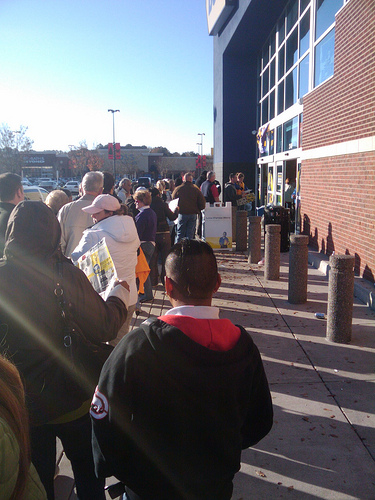

It's Thanksgiving week. Time for Americans to indulge in two of our favorite pastimes: eating and shopping. Some of us will camp out in the kitchen, jostle for space at crowded dinner tables, calculate the perfect turkey cooking times and reflect on everything we have to be thankful for. And some of us will camp out in Macy's (M), Costco (COST), and Toys R Us, parking lots, jostle for space at the front of long lines, calculate shopping budgets and reflect on the deals we scored.
All the effort spent strategizing, planning and executing our Thanksgiving menus, pales in comparison to the time companies spend strategizing, planning and executing Black Friday, the day that millions of shoppers will head to the stores to get an early jump at holiday shopping and sales.
But, the day is not all about deals and sales. Black Friday serves as one gauge of the overall health of the economy and one of the main areas of attention every year, and I'm sure there will be no shortage of news on this topic, is whether shoppers will show up to the stores and spend. There are always reasons to avoid the stores. Harris Interactive polls show that 62 percent of shoppers who stay away from Black Friday blame the crowds. Thirty four percent don't want to wake up that early. There's also the pushing, fighting with other shoppers, missing out on family time, and the long lines.
But even with all those reasons, 34 percent of U.S. shoppers still hit the stores on Black Friday last year, up from 31 percent in 2010. That was 212 million individuals, spending an estimated $45 billion dollars.
As a consumer products company investor and CEO of CircleUp, a crowdfunding site for retail and consumer product companies, I'm always excited when this week rolls around to see what types of shopping habits are trending. This year, it looks like what is old is new again, with Furby, Teenage Mutant Ninja Turtles, Legos and Barbies all topping retailer's "hot toys" lists. More than 60 percent of consumers plan to purchase clothing, entertainment products, and electronics. While 40 percent plan to purchase toys, 18 percent will purchase sporting goods and 18 percent will purchase jewelry.
This is the time of year when consumer products companies engage with their customers and make big sales. Black Friday allows retailers to sell inventory and create space for new holiday products. And it's also a great way for trend spotting and preparing for next year's product launches. Retailers and products companies struggle with this issue every year: How do we get our products in the hands of consumers who want them, without asking them to tent out in a parking lot at 3:00 a.m., and asking our staff to come in and work on their Thanksgiving holidays -- a key issue that Wal-Mart and its employees are fighting over today. The answer is Cyber Monday.
Savvy Black Friday shoppers already know how to get around the pain of in-store purchases. Twenty seven percent of shoppers plan to avoid crowds on Black Friday and shop online only. Forty one percent will shop online during Cyber Monday (Source: SEO.com). Even through the downturn, there has been across-the-board growth in online holiday shopping. Retailers continue to increase their search-engine ad budgets to drive consumers to their web stores. In 2010, over $1 billion dollars was spent on Cyber Monday.
Cyber Monday represents a fantastic trend that benefits both consumers and small consumer product businesses. Needless to say, consumers love the idea of getting their shopping done in less time, with less hassle, and while sitting at home in their pajamas -- 84 percent of Cyber Monday purchases are done at a computer in a home. But the trend also benefits a wide range of small businesses.
Just as Crowdfunding democratizes the fundraising process for companies, allowing even the smallest of companies to get a global platform and attract new investors -- Cyber Monday shopping does the same for small consumer product companies. As consumers move to the web to make their holiday purchases, they no longer have to make the tough choice of whether to head only to Wal-Mart (WMT), Best Buy (BBY), or Target (TGT) (the three most popular retailers for Black Friday in 2011. On the web, consumers can search across many marketplaces, finding the best deals and avoiding the traps. Small toy or clothing companies who may not have a presence at Wal-Mart are newly empowered by Cyber Monday, and small retailers who may not attract the crowds on Black Friday can still push product through their web channel. This isn't rocket science -- it's just more efficient. And has been for many years.
I view Cyber Monday as a fantastic trend in the consumer products industry, empowering companies based on their product quality and consumer popularity, and not necessarily on their distribution power. For years it has given high-growth exciting brands a chance to get in front of consumers. Although I'm looking forward to reviewing the buying trends and sales numbers from Black Friday, this year, I'm sleeping in, logging on, and buying all of my holiday gifts online.